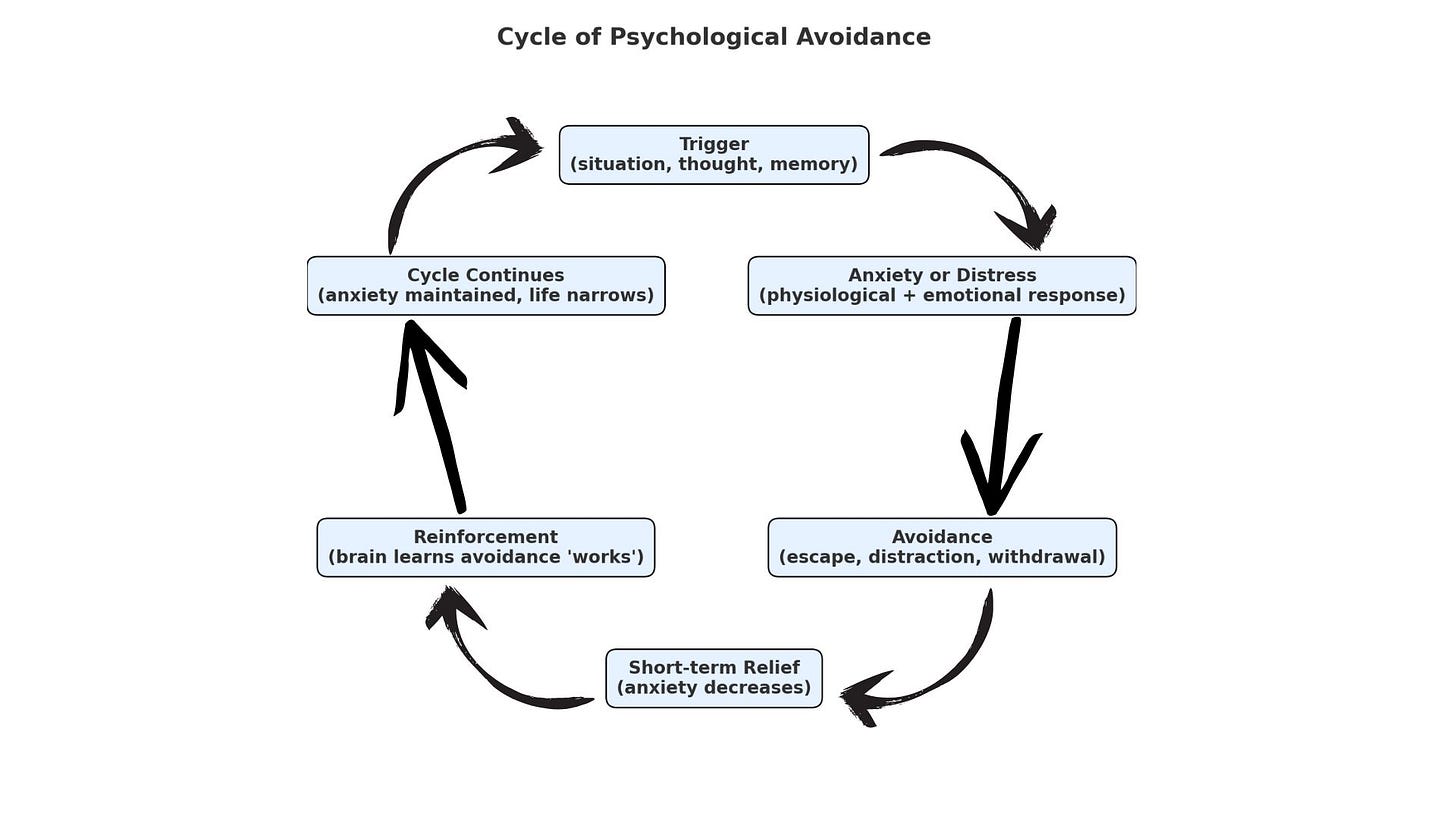Avoiding Avoidance
Don't run away.
In the mental health world, avoidance is a big deal. No one wants to feel bad. When something makes us anxious or give us another kind of distress, it is natural to want to try to ensure it doesn’t happen again. We have learned to avoid things that are harmful. Burn yourself once on the stovetop, and chances are you won’t touch it again. This behavior is helpful when we’re talking about staying out of the way of a dangerous animal or not eating a poisonous plant, but avoiding other kinds of unpleasant experiences can actually have really harmful consequences.

In the context of mental health, avoidance is a coping mechanism that keeps the individual away from thoughts, emotions, or situations that are unpleasant or cause anxiety. This is often called escape behavior.
Let’s look at some situations when this avoidant behavior can be problematic. If you have a boss who is demanding and raises your anxiety level, keeping your head down may help to reduce the number of times that you have to endure their rants. So staying away from them may initially make you feel better at work. Over time, however, not interacting with the boss may harm your performance. You will be less likely to know what they want, less likely to be noticed for your good work, and may actually be considered a poor employee, because in your boss’s eyes, you are never around.
This could get worse. By practicing avoidance, you are making yourself feel better temporarily, but you are maintaining your anxiety response to the boss because you are not allowing your natural extinction process to work. Extinction is the natural process of getting used to an adverse stimulus so that it becomes more tolerable over time. People who live in a noisy neighborhood can get used to the noise; people who work in a smelly environment can more easily tolerate the smell over time. By the same token, hearing your boss rant and rave over and over again gradually begins to lose its power over you. Avoidance doesn’t allow this extinction process to work, so your anxiety continues at the same level or increases.
At first, avoiding something negative can feel like it works. I had a client who was deathly afraid of railroad crossings. She had witnessed an accident with a train, and never wanted to cross the tracks again. She could find new routes to drive to work that avoided train tracks, and she did this for a long time. She didn’t come to me until her company relocated to a building that turned out to be surrounded by train tracks. Her avoidance had allowed her fear to be maintained, and even reinforced some catastrophic beliefs. She had read about every railroad accident over the last three years throughout the state, and some across the country. Her life had also been impacted at times, when she had to take a route that added over an hour to get to a meeting.

There are many examples of concerns that avoidance can make even worse. I’ve worked with a large number of veterans who were impacted by traumas and developed variations of PTSD (post traumatic stress disorder). Many of these people went to great lengths to avoid any reminders of their trauma, which means that their trauma memories continued to be unprocessed, and they continued to be deeply distressed by these memories. Avoiding reminders can also be really limiting. If the trauma is related to driving a vehicle, it can be nearly impossible to get everywhere you want to go by walking, or expensive to always get someone else to drive.
There are three basic kinds of avoidance: situational, cognitive, and emotional. Situational avoidance means staying away from specific people, places, or activities that cause stress. Cognitive avoidance is trying to keep from thinking a distressing thought. We all know how hard this is — don’t think about a pink elephant. Our minds are pretty amazing at doing this, and some people can suppress thoughts or distract themselves from thinking about a certain subject without even knowing it. This can show up as constant worrying, obsessions, or fantasies that are believed to be real. The last type, emotional avoidance, usually involves behaviors like keeping extremely busy to distract oneself or avoiding doing things that bring up certain emotions. Substance abuse is another way to avoid emotions, and this can lead to terrible consequences.
Carl Jung wrote,
People do not realize just how much they are putting at risk when they don’t accept what life presents them with, the questions and tasks that life sets them. When they resolve to spare themselves the pain and suffering, they owe to their nature. In so doing, they refuse to pay life’s dues and for this very reason, life then often leads them astray. If we don’t accept our own destiny, a different kind of suffering takes its place: a neurosis develops, and I believe that that life which we have to live is not as bad as a neurosis. If I have to suffer, then let it be from my reality. A neurosis is a much greater curse! In general, a neurosis is a replacement for an evasion, an unconscious desire to cheat life, to avoid something. One cannot do more than life what one really is. And we are all made up of opposites and conflicting tendencies. After much reflection, I have come to the conclusion that it is better to live what one really is and accept the difficulties that arise as a result — because avoidance is much worse.
Instead of avoidance, we all need to focus on acceptance, problem-solving, and tolerance. Facing your fears can be difficult, but it really is better than the alternative. If you or someone you love is struggling with anxiety or depression, a mental health professional can help you to feel better without resorting to avoidance.



